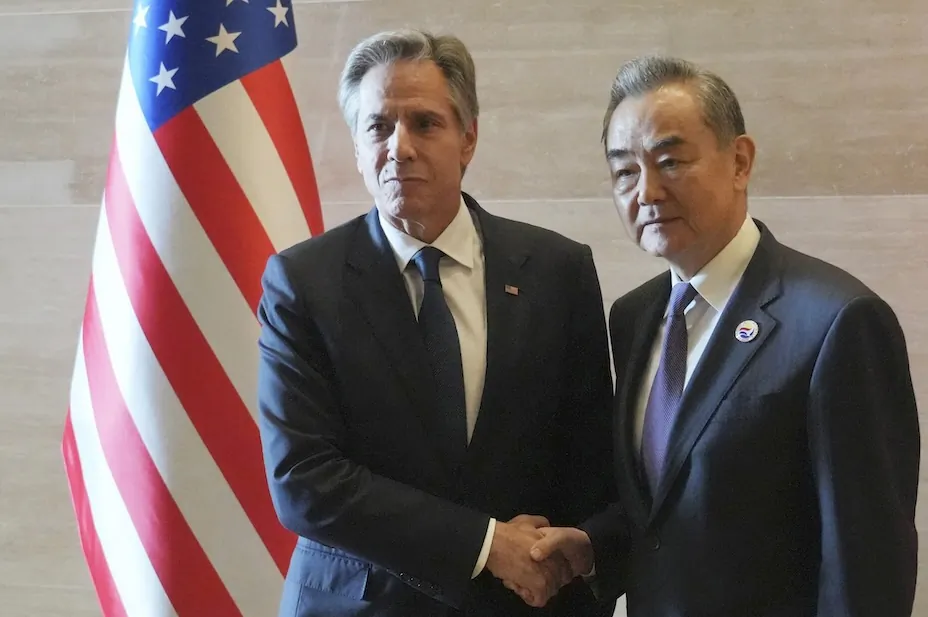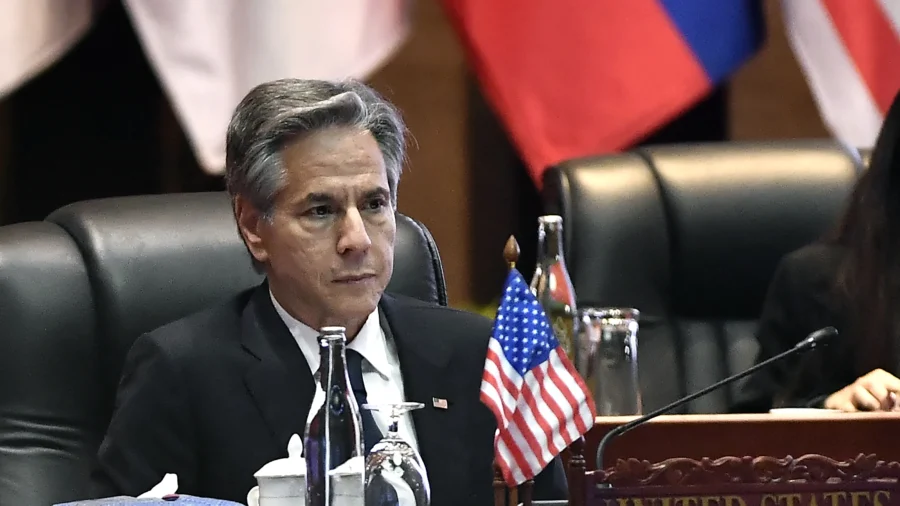U.S. Secretary of State Antony Blinken on Saturday told his Chinese counterpart that the United States and its partners will advance a “vision for free and open Indo-Pacific,” on the sidelines of a Southeast Asian regional forum in Laos.
State Department spokesman Matthew Miller said in a readout that Mr. Blinken and Chinese foreign minister Wang Yi had “open and productive discussions” on numerous important issues. The two were in Laos Vientiane to participate in the Association of Southeast Asian Nations (ASEAN) meetings.
It marks the sixth meeting between Mr. Blinken and Mr. Wang since last year. The meeting comes as China is increasingly aggressive against Taiwan and the Philippines, as well as tensions between China and the United States over Beijing’s role in Russia’s war in Ukraine.

“The Secretary raised concerns about the PRC’s destabilizing actions in the South China Sea, including at Second Thomas Shoal, and affirmed the United States’ support for freedom of navigation and overflight and the peaceful resolution of disputes, consistent with international law,” Mr. Miller stated, referring to China’s official name, the People’s Republic of China.
On Saturday, the Philippines’ Department of Foreign Affairs announced that its personnel had transported food and other supplies to the Second Thomas Shoal in the South China Sea without any incident, doing so for the first time since the two sides agreed to a deal on July 21.
Before reaching the deal, China’s coast guard and other forces had used water cannons and maritime maneuvers to prevent the Philippines from bringing supplies to its military personnel stationed at the Second Thomas Shoal.
Speaking at the ASEAN post-ministerial conference before meeting with Mr. Wang, Mr. Blinken said he was pleased that the Sino-Filipino deal had made a difference. “We applaud that and hope and expect to see that it continues going forward,” he added.
Taiwan
On Taiwan, Mr. Blinken emphasized the importance of “maintaining peace and stability across the Taiwan Strait.”
The Chinese Communist Party (CCP) is aiming to take over Taiwan, believing that the self-ruled island is a renegade province. In recent years, the Chinese regime has been using military coercion, such as sending military planes and vessels to areas near Taiwan, in an effort to influence the island’s public opinion and government policies.
Taiwan President Lai Ching-de took office in May after his election victory in January. Since then, the CCP has ramped up pressure on the Lai administration, including launching two days of what it called “punishment” military drills encircling Taiwan.
U.S. Assistant Secretary of Defense for Indo-Pacific Security Affairs Ely Ratner said that a Chinese invasion of Taiwan “is neither imminent nor inevitable,” during an event held by the American Enterprise Institute on July 24, while citing U.S. Secretary of Defense Lloyd Austin.
“The entire world has a stake in peace and stability in the Taiwan Strait. And I think we are seeing the manifestation of that in our private and public diplomacy every day in terms of more and more countries around the world expressing the importance of maintaining stability in the Taiwan Strait,” Mr. Ratner added.
According to a readout of the meeting from China’s foreign ministry, Mr. Wang told Mr. Blinken that Taiwan “will not be a country in the future” and China is “working toward the goal of unification.”
“The Secretary reiterated serious concern with PRC support for Russia’s defense industrial base and made clear that if the PRC does not act to address this threat to European security, the United [States] will continue to take appropriate measures to do so,” Mr. Miller said.
During a press briefing on July 25, said that the Biden administration has imposed over 300 sanctions and export controls on Chinese entities for their support of Russia’s war. “We will not hesitate to impose additional measures as necessary,“ he said at the briefing.
Human Rights
Mr. Blinken also spoke to Mr. Wang about U.S. concerns about China’s human rights records.
“The Secretary reiterated that the United States will continue to take necessary actions to safeguard our interests and values, and those of our allies and partners, including on human rights,” Mr. Miller said. “He underscored that it remains a top priority to resolve the cases of American citizens who are wrongfully detained or subject to exit bans in China.”
In January, Sens. Tim Kaine (D-Va.), Marco Rubio (R-Fla.), Jeff Merkley (D-Ore.), and Marsha Blackburn (R-Tenn.) wrote a letter to Mr. Blinken expressing concerns about China’s human rights abuses, including China’s wrongful detentions of at least three U.S. citizens—Mark Swidan, Kai Li, and David Lin.
The letter also mentioned China’s human rights violations in Xinjiang, Tibet, and Hong Kong, as well as its abuses against Chinese rights defenders.
“The CCP continues to wield the PRC’s legal system to intimidate, punish, and silence Chinese activists for raising awareness of civil and social issues that the CCP does not want discussed, advocating for human rights, and criticizing government policies and practices,” the senators’ letter reads, pointing to the cases of Sophia Huang, Wang Jianbing, and Gao Zhisheng.
In recent years, the Biden administration has sanctioned Chinese officials for abuses against Uyghurs in Xinjiang and for suppressing freedoms in Hong Kong.
The Associated Press contributed to this report.
From The Epoch Times

